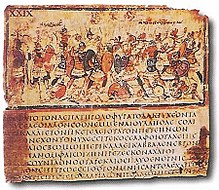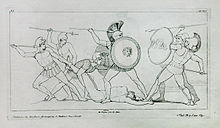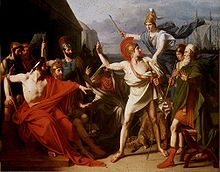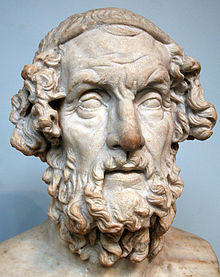Iliad
![]()
The title of this article is ambiguous. For other meanings, see Iliad (disambiguation).
The Iliad (ancient Greek Ἰλιάς Iliás), one of the oldest written fictional works in Europe, describes a section of the Trojan War. It is difficult to place its origin in time, but nowadays it is dated to the 8th or 7th century B.C. The epic comprises 24 books or cantos, as these sections have been called since the translation by Johann Heinrich Voß. The Iliad is based on early historical myths and tales and is traditionally attributed to Homer (for authorship, including with regard to the Odyssey, see Homeric Question). The Iliad's depiction of the Olympian gods may have contributed significantly to the development of a national Greek religion and continues to shape European art and humanities to the present day.
The subject is the Trojan War between Troy and the Greek Achaian alliance, which has already lasted nine years. The central theme of the Iliad is wrath, which in the course of its 51-day course draws ever wider circles and befalls both heroes and gods as an inescapable fate. It begins with the dishonouring of the god Apollo by the theft of Chryseïs and his revenge on the Achaians. When finally the daughter is returned to Chryses, the priest of Apollo, Agamemnon, commander-in-chief of the Achaians, demands compensation for his booty and thus comes into conflict with Achilles, who subsequently also sees himself dishonoured and withdraws from the fighting. The "wrath of Achilles" becomes the parenthesis of the epic, but finds a new cause towards the end. Thus, in the 19th canto, Achilles averts the final defeat of the Achaians by publicly reconciling with Agamemnon and re-entering the fray, only to give way to anger at Hector, who had previously killed his best friend and comrade-in-arms Patroclus. Achilles' anger is not tempered until the last or 24th canto, when he leaves Hector's body to his father Priam for burial after 12 days of desecration.
The mythical starting point for the Trojan War is the judgment of Paris and his abduction of Agamemnon's sister-in-law Helen. Both are described in the Kypria. Knowledge of this is assumed in the Iliad and is therefore only briefly alluded to once. The cunning of Odysseus (Trojan horse) and the end of the Trojan War are then not told in the Iliad, but among others in the Iliu persis of the so-called Epic Cycle.
The Iliad is one of the most important works of world literature.

Manuscript F 205 of the Biblioteca Ambrosiana in Milan (Iliad Ambrosiana) with text and illustration of verses 245-253 of the eighth book of the Iliad from the late 5th or early 6th century AD.

Copper engraving 18,8 × 34,3 cm 1793 after a drawing by John Flaxman

The painting La Colère d'Achille ("The Wrath of Achilleus"), with which Michel-Martin Drolling won the Prix de Rome in 1810, shows the moment of the army assembly called by Achilleus, in which Athena prevents him from taking action against Agamemnon and his insult. It is now in the École nationale supérieure des beaux-arts de Paris.
Work title
The ancient Greek word Ἰλιάς [Iliás] is a feminine adjective formation of Ἴλιος [Ílios], an alternative name for Troy; thus it means "belonging to Troy, connected with Troy, Trojan". Substantivized, it can also mean the countryside around Troy, the Troad, or a woman originating from Troy. Its use as a title for what is still called today is first found in Herodotus' Histories (2, 116). This usage must have been preceded by a compound (nowhere attested) such as Ἰλιὰς ποίησις [Ilias poíesis] ("the poetry dealing with Troy"). A syntagmatic use of the name is found before Herodotus in Aeschylus, Simonides of Keos, and Euripides. Already Sappho writes about the Iliads. It is unclear when and why the name "Iliad" became established for a work that does not treat the entire history of Troy, not even the entire Trojan War, but only an episode from it; after all, the so-called cyclic epics also used this framework. Presumably this reflects the superior position accorded to the Iliad in comparison with the other Troy poems.

Homer, the surviving author of the Iliad; 2nd century AD Roman copy of a Hellenistic original. British Museum, London
Storyline
→ Main article: Contents of the Iliad
The work comprises 15,693 verses in 24 cantos, marked with capital Greek letters according to the standard alphabet of Eukleides in 403 BC; the length of the books varies roughly between 400 and 900 verses.
The wrath motif that pervades the entire epic, however, comes to the fore more strongly in only a few of the 24 books. Achilles' anger is developed by Agamemnon's dishonour for robbing his prey-girl Briseïs in order to make an example of his power on him. Achilles bows to this and goes on strike and thus into the background of the Iliad. Thus, in the 2nd through 8th books, the narrator is able to incorporate scenes from earlier years of the war and depict a first meeting of the warring parties. It is not until the 9th book that Achilles is addressed again, as the other Achaians have realized that they cannot stand against the Trojans without him and his comrades-in-arms. However, since Agamemnon does not want to apologize for his misbehavior and Achilleus' anger is still too great, he refuses to compromise and thus not only opposes Agamemnon, but also the other Achaians. He thereby decides the death of many companions, since Zeus grants the Trojans to reach the ship's camp of the Achaians. Only after that the battle shall be turned. Until this happens, the story is retarded by the depiction of the battles around the wall in front of the ships and by divine interventions in favour of the Achaians.
In the 16th book, Zeus' plan is fulfilled, so that Achilles grants Patroclus to push back the Trojans. However, he then attacks the city in high spirits and is killed by Hector, among others. The ensuing struggle over the latter's body and the production of new weapons point to the following books. Achilles, horrified at the loss of his friend, then reconciles with Agamemnon in the 19th book and, still angry but now at Hector, charges into battle. Until the final battle with the latter in the 22nd book, however, he fights several other opponents and even gods. The final overcoming of his anger then takes place only after the mistreatment of Hector's corpse and death games for Patroclus' cremation in the 24th book. To do this, he must first meet the father of his arch-enemy - Priam - who, like Achilles, has suffered a heavy loss.
In the following, the structure of the work is outlined with the help of a table.
| Day/Night | Lot | Number of verses | Storyline |
| Proemium | 1, 1–7 | 7 | Book 1: Topic Overview |
| Day 1 | 1, 8–52 | 45 | Agamemnon insults and expels the priest Chryses, who wants to free his daughter Chryseïs, a prisoner of war, whereupon the latter asks his god Apollo for satisfaction. |
| Days 2-9 | 1, 53 | 1 | A plague sent by Apollo rages for nine days. |
| Day 10 | 1, 54–476 | 423 | An army meeting is called by Achilles because of the plague, in which Agamemnon and Achilles fall out. Mediation by Nestor is unsuccessful. Finally Agamemnon gives in, but demands Achilleus' prey-girl Briseïs as a replacement, which the latter does not approve of. Achilles' request to his mother Thetis for honour and satisfaction by Zeus. Return of Chryseïs to the island of Chryse. |
| Day 11 | 1, 477–492 | 16 | Return of the legation from Chryse. |
| Day 12-20 | (1, 493) | (1) | All the gods are with the Aithiopians for twelve days. |
| Day 21 | 1, 493–611 | 119 | The gods are back on Olympus; Zeus grants Achilles' wish to Thetis despite Hera's objection. Their conflict dissolves in laughter. |
| Night before day 22 | 2, 1–47 | 47 | Book 2: Zeus sends Agamemnon a dream that he would now defeat the Trojans. |
| Day 22 | 2, 48to7 | 3653 | First day of battle. Army assembly by Agamemnon including examination of the army: the Greeks feel encouraged to leave Troy, but are changed their minds after speeches by Odysseus and Nestor. Enumeration of all Greek ship's crews and Trojan peoples. Breakout of the Trojans from Ilios. Book 3: Wall-show and introduction of the Greek heroes by Helen and Priam. Duel between Menelaus and Paris, from which the latter is rescued. 4th book: breaking of oath by the Trojans on account of an attack on Menelaus. Battle at first undecided. 5th book: Aristia (succession of victories) of Diomedes, leading, among other things, to the unhorsing of Aineias and the wounding of gods. 6th book: Hector asks Athena in vain to fight off Diomedes in Troy, and meets his family there for the last time. Book 7: Duel between Hector and Aias, which is broken off with slight advantages for the latter. Consultations of the Achaians and Trojans in the evening. |
| Day 23 | 7, 381–432 | 52 | Burial of the dead. Ceasefire. |
| Day 24 | 7, 433–482 | 33 | Construction of a wall and a ditch around the camp of the Greeks. Evening celebration. |
| Day 25 | 8, 1–488 | 488 | Second day of battle. Book 8: After initial advances by the Achaians, the Trojans are able to reach across the moat with Zeus' help. |
| Night before day 26 | 8, 489to10 | 1369 | The Trojans spend the night outside the camp of the Greeks, followed by gatherings on both sides. Book 9: On the Greek side, a legation is initiated with gifts to Achilles to appease his anger. After speeches by Odysseus, Phoinix and Aias, the latter rejects a peace treaty. Book 10: Roused from sleep, Agamemnon sends Diomedes and Odysseus as scouts to the Trojan camp. They encounter a Trojan scout, Dolon, extort information from him and then kill him. In the Trojan camp they kill the Thracian king Rhesos and steal two of their horses, on which they then ride back. |
| Day 26 | 11, 1to18 | 5294 | Third day of battle. Book 11: Aristia of Agamemnon and Hector. Wounding of several Greek princes. 12th book: first Trojan attack on the Greek wall by Asios, Sarpedon and Hector in particular. Book 13: Poseidon briefly supports the Greeks especially after Hector kills one of his sons. Aristia of Idomeneus' and Menelaus'. Book 14: Hera distracts Zeus with an eroticizing belt and makes him fall asleep after making love through Hypnos. Poseidon is now better able to support the Achaians, who can once again push the Trojans toward the city. Book 15: Zeus awakens in a rage and calls Poseidon out of the battle. Apollo supports Hector, who can now advance to the ships. Book 16: Patroclus asks Achilles for permission to help his Greek friends with the Myrmidons. The latter grants him to repel the Trojans, and in return gives him his armour and horses. Patroclus uses these, but presses on and is able to kill the Lycian king Sarpedon. After Patroclus tries to take Troy four times, he is pushed back by Apollo, who is finally able to kill him with Euphorbos and Hector. Book 17: Battle for Patroclus' armor, corpse, and team. The armor is captured by Hector, the corpse is protected by Menelaus and Meriones. Book 18: Antilochos tells Achilles of the death of his friend Patroclus. Thereupon he wishes for new weapons from his mother Thetis and drives the Trojans away by his appearance and roar alone. |
| Night before day 27 | 18, 243–617 | 375 | Polydamas advises the Trojans in a meeting to retreat behind the safe city walls. Hector, however, can prevail with his wish for a decision of the battle. On the Greek side, the dead Patroklos is mourned. Thetis gets to Hephaestus, who makes a new shield, as well as armour, helmet and greaves for Achilleus. |
| Day 27 | 19, 1to23 | 2111 | Fourth day of battle. Book 19: Thetis hands over the weapons to Achilles, who then reconciles with Agamemnon in an army meeting. Achilleus wants to attack immediately, but the army is to have breakfast first. After renewed complaints about Patroclus' death, they prepare for battle. Book 20: Aineias attacks Achilles, but is saved from imminent defeat by Poseidon. Aristia of Achilles'. Hector attacks Achilleus despite Apollo's prohibition. Book 21: Achilles dishonours the river Skamandros, whereupon the latter attacks him with the Simoeis. Only Hephaistos can save the desperate man. Afterwards, a battle of the gods takes place with advantages for the Greek-friendly gods. After the retreat of the other gods, Apollo remains behind and distracts Achilles so that the Trojans can flee to the city. Book 22: Apollo reveals himself to Achilles, while Hector decides to fight Achilles, but then flees from him first. When he is confronted, the gods deliberate on the outcome of the duel. The scales of fate turn against Hector, whereupon Apollo abandons him and Athena subsequently deceives him. Achilles finally kills Hector and drags his body. Lamentations of the Trojans for Hector. Book 23: Preparations for Patroclus' burial. |
| Night before day 28 | 23, 59–108 | 50 | Patroclus Psyche prophesies Achilles' imminent death, asks for a common grave and an early burial. |
| Day 28 | 23, 110–216 | 107 | Burning Patroclus' body. |
| Night before day 29 | 23, 217–225 | 9 | Achilles gives wine to Patroclus and laments for him. |
| Day 29 | 23, 226–897 | 672 | Competitions to honor the dead: Chariot race with disputes over the placings, boxing, wrestling, running, javelin, archery and javelin throwing. |
| Night before day 30 | 24, 1–30 | 30 | Book 24: Achilles cannot sleep, mourns Patroclus' corpse, and drags Hector's body. |
| Days 29-40 | (24, 31) | (1) | Achilles drags Hector's body for a total of twelve days. |
| Day 40 | 24, 31–158 | 128 | Consultation of the gods about the theft or return of Hector's body. Achilles is finally to be asked to do the latter, whereupon Zeus sends Iris to Thetis, who presents Zeus' order to her son. Achilles accepts this. |
| Night before day 41 | 24, 159–694 | 536 | Iris asks Priam to present Achilles with gifts for the delivery of Hector's body. He gets ready to travel and is led to Achilleus' tent by Hermes in the guise of a Myrmidon. The two characters come to know and appreciate each other in mutual conversation. Achilleus eventually grants Priam the return of the body. During the night, Priamos is awakened by Hermes so that he can quickly return to Ilios. This Priamos then does. |
| Days 41-49 | 24, 695–784 | 90 | Lamentations for Hector by Andromache, Hecabe and Helena. Procurement of wood for Hector's burial. |
| Day 50 | 24, 785–787 | 3 | Light Hector's pyre. |
| Day 51 | 24, 788–804 | 17 | Burial of Hector's bones. |
Questions and Answers
Q: What is the Iliad?
A: The Iliad is an ancient Greek epic poem written down in the 8th century BC. It was originally spoken as an oral epic poem and includes early Greek myths and legends, possibly based on a Bronze Age attack on Troy.
Q: Who wrote the Iliad?
A: People usually say that Homer wrote the Iliad, however scholars are not sure if it was really written by just one person.
Q: When does the story of the Iliad take place?
A: The story of the Iliad takes place during the Trojan War, around 1200 BC.
Q: What is included in the Iliad?
A: The poem includes confrontations between warrior Achilles and King Agamemnon, as well as many other Greek myths about the war. It tells a story from Achilles' wrath to Hector's death and funeral and ends with a siege of Troy.
Q: How long is the Iliad?
A: The Iliad is an epic (or very long) poem with 24 chapters written in hexameter.
Q: Who are some important characters in the Iliad?
A: Some important characters in this work include Achilles, Odysseus, Agamemnon, Menelaus, Priam, Hector, Paris, and Helen.
Search within the encyclopedia